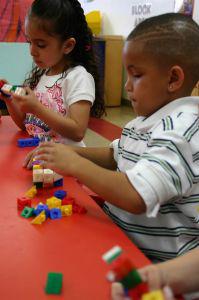 A growing number of psychologists believe that changes in the way children play and what they play at and with has also changed kids’ cognitive and emotional development.
A growing number of psychologists believe that changes in the way children play and what they play at and with has also changed kids’ cognitive and emotional development.
As it turns out, time spent in make-believe play, in free play, which allows a child use his or her imagination rather than engaging in structured play activities helps children develop a critical cognitive skill called executive function. Executive function has a number of elements, but a critical element is the ability to self-regulate. Kids with have good self-regulation are able to control their emotions and behavior, resist impulses, and exert self-control and self discipline.
A study done a few years ago replicated a study of self-regulation first done in the late 1940s, in which psychological researchers asked kids ages 3, 5 and 7 to do a number of exercises. One of those exercises included standing perfectly still without moving. The 3-year-olds couldn’t stand still at all, the 5-year-olds could do it for about three minutes, and the 7-year-olds could stand pretty much as long as the researchers asked. In 2001, researchers repeated this experiment. But, psychologist Elena Bodrova at Mid-Continent Research for Education and Learning says, the results were very different.
“Today’s 5-year-olds were acting at the level of 3-year-olds 60 years ago, and today’s 7-year-olds were barely approaching the level of a 5-year-old 60 years ago,” Bodrova explains. “So the results were very sad.”
Poor executive function is associated with high dropout rates, drug use and crime. In fact, good executive function is a better predictor of success in school than a child’s IQ. Children who are able to manage their feelings and pay attention are better able to learn. As executive function researcher Laura Berk explains, “Self-regulation predicts effective development in virtually every domain.”
According to Berk, one reason make-believe play is such a powerful tool for building self-discipline is because during make-believe, children engage in what’s called private speech: They talk to themselves about what they are going to do and how they are going to do it.
“In fact, if we compare preschoolers’ activities and the amount of private speech that occurs across them, we find that this self-regulating language is highest during make-believe play,” Berk says. “And this type of self-regulating language has been shown in many studies to be predictive of executive functions.
Unfortunately, the more structured the play, the more children’s private speech declines. Essentially, because children’s play is so focused on lessons and leagues, and because kids’ toys increasingly inhibit imaginative play, kids aren’t getting a chance to practice policing themselves. When they have that opportunity, says Berk, the results are clear: Self-regulation improves.”
According to Yale psychological researcher Dorothy Singer, teachers and school administrators just don’t see the value and benefits of imaginative play and such play is in decline.
“Because of the testing, and the emphasis now that you have to really pass these tests, teachers are starting earlier and earlier to drill the kids in their basic fundamentals, play is viewed as unnecessary, a waste of time,” Singer says. “I have so many articles that have documented the shortening of free play for children, where the teachers in these schools are using the time for cognitive skills.”
As on psychologist summed it up…With an ever growing focus on giving children every advantage our culture has unwittingly compromised one of the activities that helped children most.
 A growing number of psychologists believe that changes in the way children play and what they play at and with has also changed kids’ cognitive and emotional development.
A growing number of psychologists believe that changes in the way children play and what they play at and with has also changed kids’ cognitive and emotional development.
